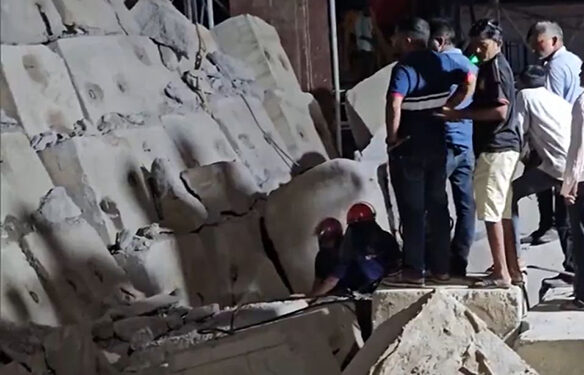NE NEWS SERVICE
AHMEDABAD, NOV 5
Three of the four workers trapped in the collapse of an under-construction structure for the Mumbai-Ahmedabad bullet train project at Rajupura village near Vasad in Anand district on Tuesday have died. One person was rescued and is receiving treatment at a hospital.
The collapse took place around 5 pm near the Mahi River when a temporary structure of steel and concrete block being used for foundation work gave way at the construction site.
“Three workers have died in this incident. Two workers were initially taken to hospital for treatment, where one of them succumbed to injuries. Another worker who was trapped in the debris was also found dead. The surviving worker is currently receiving treatment at the hospital,” Anand district superintendent of police Gaurav Jasani said.
- The collapse took place around 5 pm near the Mahi River when a temporary structure of steel and concrete block being used for foundation work gave way at the construction site
- One labourer has been rescued and has been recovering in the hospital: NHSRCL
The National High Speed Rail Corporation Limited (NHSRCL), which is implementing the project, had earlier confirmed that four labourers were trapped between concrete blocks at the construction site. Emergency response teams, including police and fire brigade officials, rushed to the scene as soon as the collapse was reported.
“Rescue operation is in progress using cranes and excavators. One labourer has been rescued and has been recovering in the hospital,” the National High Speed Rail Corporation stated.
In all four workers were trapped under concrete blocks and two of them died on the spot, said Anand fire officer Dharmesh Gor.
This is the second fatal accident at the bullet train project site in recent months. In August this year, one labourer was crushed to death and at least six others were injured after a part of the construction crane collapsed near Kambola village in Vadodara district.
The Mumbai-Ahmedabad High Speed Rail Corridor, India’s first bullet train project, spans 508 kilometers and will run trains at speeds of up to 320 kilometers per hour. The project incorporates Japanese Shinkansen technology and aims to reduce travel time between the two cities from six hours to about two hours.










